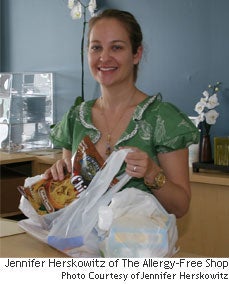From Problems to Profits For these entrepreneurs, pressing personal needs were the inspiration for thriving startups.
By Amy Reinink
Opinions expressed by Entrepreneur contributors are their own.
Jennifer Herskowitz spent years scouring aisles and studying labels at Whole Foods and stores like it, wishing there was a shop that stocked well-organized, clearly labeled allergy-free products for her kids, who have serious food allergies.
 Herskowitz, an attorney with no retail experience, found a solution in 2007: She opened such a store herself.
Herskowitz, an attorney with no retail experience, found a solution in 2007: She opened such a store herself.
The Allergy-Free Shop has grown steadily since its inception, with an evenly balanced cash flow as of this year.
From products that serve those with learning disabilities to those catering to specific medical conditions, many startups have thrived by filling a specific and personal need. Below, Herskowitz and other entrepreneurs who have done so share their tips.
Michael Ziman can say he started product-testing for ReadTheWords.com before he graduated high school.
As a child, Ziman's teachers labeled him an auditory learner who had trouble absorbing written information unless he heard it read aloud. To cope, he made recordings of his class notes and listened them to study for tests--a tactic he continued and refined through business school at the University of Michigan.
It wasn't until he listened to a recording of a real-estate seminar in his adult life that he realized others had the same problem, and that he could use his entrepreneurial skills to help them.
ReadTheWords.com, launched in January 2008, lets users plug text in to the website and get a pleasant, human-sounding voice reading the text back to them.
In addition to serving students of all ages who learn better by auditory means, Ziman says his market includes tech-savvy types who want to convert text files to mp3s to load onto their iPods.
The site earns revenue by offering limited free accounts, then selling upgraded annual memberships for $20 or $50. The site started turning a profit this year.
"People are similar, so chances are, if you have a need, someone has that same need," Ziman says. "The stars align when you do your research and find an underserved market, and find that you can provide something that's not out there for a competitive price."
 Mike Lee and his family had their gluten-free existence down to a science, and knew exactly which restaurants, products and recipes to avoid.
Mike Lee and his family had their gluten-free existence down to a science, and knew exactly which restaurants, products and recipes to avoid.
Last year, an idea woke Lee--then a tech recruiter--in the middle of the night: Why couldn't there be a fun website helping those with celiac disease or gluten intolerance actually enjoy cooking and eating?
Lee says even before conducting formal market research, he knew that if his gluten-intolerant wife, a registered nurse and masterful researcher, hadn't found such a resource in her web searches, chances were it didn't exist.
"You could spend hours online reading gluten-free websites and have a good idea of what not to eat," Lee says. "But you'd walk away from the computer not knowing what to feed your family for dinner that night."
Lee launched Gling.com in September, offering gluten-intolerant eaters a site to research and compile recipes, products, restaurants, shopping resources and more.
Lee says he expects Gling.com, which employs three writers, to turn a profit by the end of next year. He says early success has stemmed in part from honest market research involving focus groups and conversations with gluten-free bloggers. He says he's also found success by abandoning his pet ideas when they don't make business sense, even as he retains his passion for and connection to the overall business.
"The best business you can ever run is something you know about personally and passionately," Lee says. "Many times, people overlook their own hobbies and own passions, and don't realize that there's a business there waiting to be built.
Herskowitz wasn't looking for a business opportunity before she opened The Allergy-Free Shop, but she says staying true to the personal need the store is founded upon has helped her achieve entrepreneurial success.
"It's not a luxury item we're selling," Herskowitz says. "People need to eat, even if they're short on funds."
She also credits her success to being the kind of business she would have loved to find as a mom shopping for kids with dietary restrictions. When a customer called looking for a chocolate pudding that didn't contain dairy or soy that wasn't already among her store's more than 2,000 products, Herskowitz called manufacturers from Italy to Australia to locate it.
"If you're starting a need-based company, you must focus continuously on the people who need you," Herskowitz says. "It might affect my profit margins to import items from Italy or Australia, but if it's what our customers need, we do it."







